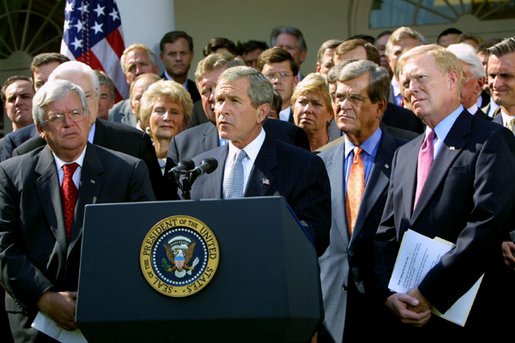
President George W. Bush along with bipartisan leaders from the House and Senate announced the Joint Resolution to authorize the use of the United States Armed Forces against Iraq. "The statement of support from the Congress will show to friend and enemy alike the resolve of the United States," President Bush said during the announcement in the Rose Garden, Wednesday, October 2, 2002. White House photo by Paul Morse.
http://georgewbush-whitehouse.archives.gov/news/releases/2002/10/images/20021002-7_d-iraq10022002-th-1-515h.htmlCongress capitulates to Bush's call for war
by Doug Ireland
In These Times magazine, November 2002That both houses of Congress would pass a resolution giving George W. Bush a free hand to take the country to war against Iraq whenever he felt like it-and that this blank check would be supported by quite large majorities-was never in doubt over these past few terrible and depressing weeks.
Why? Because the horrors of the 9/11 attacks produced a tectonic shift in our nation's politics. The slow movement of the country's political center of gravity to the right was given hugely increased momentum by 9/11 and its aftermath. It accelerated the Democrats' drift toward the center-not just on foreign policy- and cowed a majority of the party's incumbents into a fearful reluctance to confront head on a deeply flawed but highly popular Republican president whose "crusade" against terrorism had already given him the Teflon aura of a "wartime" leader. All year long, the so called opposition party has failed to oppose. So no one should have been surprised at the lopsided vote in Congress for an unjustified war in Iraq.
What became unmistakably clear in the days before the vote, however, was the degree to which the Democratic congressional leadership, by falling into the trap so artfully laid for them months ago by Karl Rove and the rest of Bush's political cabal, had connived in undercutting their own party's chances of advancement.
When Dick Gephardt and Joe Lieberman raced to the White House to stand shoulder to shoulder with Dubya in the Rose Garden to announce their co-sponsorship of the administration's war resolution, they did more than simply give Bush "the beautiful picture he wanted" for November (as George Will gleefully crowed on ABC's This Week). Their dastardly deal with Bush also guaranteed that Iraq will continue to dominate the news right through Election Day, and thus suck the oxygen out of the bread-and-butter issues (the economy, Social Security, Medicare and the like) on which the Democrats had hoped to take back the House and preserve the Senate. Just as Rove had wanted.
Tom Daschle, too, fell neatly into the White House's pocket when he decided to fast-track the war resolution, instead of waiting until after Election Day. The country was not clamoring for an immediate decision. In fact, all the polls showed growing discomfort with the notion of a war whose purposes-as described by Bush-seemed to change every week. Those same polls also showed that a majority of voters believed Congress, not the president, should play the deciding role in committing the country to war, as indeed the Constitution demands.
http://www.thirdworldtraveler.com/Politicians/CarteBlanche_CongressBush.htmlIraq resolution introduced in Senate
Bush hails 'unity'; debate set for Thursday
Thursday, October 3, 2002 Posted: 4:55 AM EDT (0855 GMT)WASHINGTON (CNN) -- Despite some Democratic divisions, the Senate moved closer Wednesday to sanctioning war with Iraq with the introduction of a bipartisan resolution that gives President Bush the authority to commit U.S. troops.
In a Rose Garden appearance with lawmakers who support his plan, Bush hailed the resolution as a show of "unity" and declared that war with Iraq "may be unavoidable."
The Senate resolution mirrors one that House leaders and Bush administration officials agreed to earlier in the day. It would limit the use of the U.S. military force to Iraq and any "current ongoing threats" it poses, and allow Bush to use American troops to force Iraq's compliance with U.N. resolutions on disarmament.
The congressional resolution would not tie U.S. action to a U.N. resolution. http://archives.cnn.com/2002/ALLPOLITICS/10/02/us.iraq/